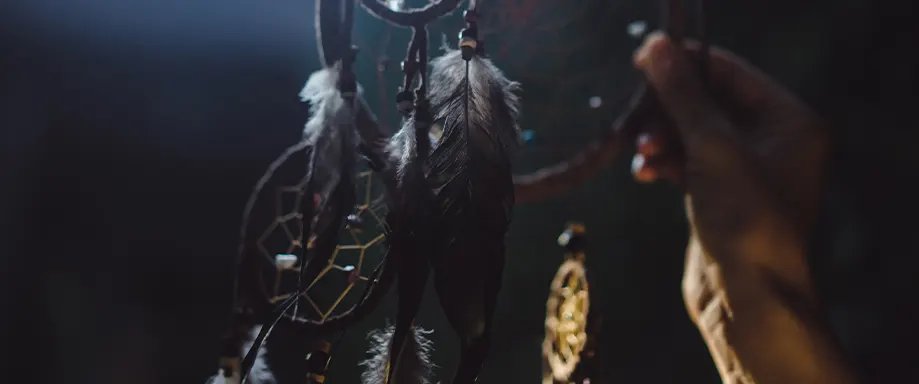The sleep pleases the soul – Orphic belief
In one Orphic Hymn to Hypnos, the god of sleep, this deity is described as: “Hypnos, king of Gods, and men of mortal birth”. The sleep is a ruler of gods, too, the Orphic text reveals to us. Later in the poem, this verse emerges:
“Thy pleasing, gentle chains preserve the soul”
The poet also calls Hypnos “the tamer of cares”.
We see that ancient Orphic mythology understood sleep as a highly beneficial and pleasing experience for the soul. As Greek mythology in general, Orphic too saw a great similarity between the realm of the death and the dream world. After all, these two beliefs rise from the same spiritual foundation.
Orphic mythology offers very interesting beliefs about travelling of the soul and the spiritual nature of the dreams. Many of these ideas can be found in later poetry and philosophy. Their influence on the ancient Greek thinking is great and is still being is explored and studied by scholars.
The spirit flies during the night – Slavic Mythology
In Slavic folklore and mythology, sleep was described as a wandering of a soul. During the sleep, the spirit would fly away and travel. During the night, the spirits of all living things, not just of humans, would wander away. In Slavic Mythology, all living creatures had some kind of a spirit that can travel in the nighttime.
In ancient Slavic folklore, there was even a mythical being Vedogon, a protector of a sleeping soul. This being was described as a spirit that belongs to the atmosphere and helps in guiding and protecting a wandering human soul.
In this old mythology, nightmares were understood as a work of evil spirit Kikimora that would sit on a person’s chest to cause an unpleasant night. There is a theory in philology that explains how the term “mora” or “mare” derived from the name of this spirit. It is believed that in almost all old European language this term “mora” was connected to the description of nightmares or night terrors.
Dreams may come from the underworld – Norse Mythology
As in many European folk tales, the Norse belief about dreams is related to the idea of communicating with the dead or with the spirits. During the sleep, the boundaries between the realms of the living and the dead weaken, so the living could receive some messages from beyond.
Besides this belief about dreams that exists in some forms through the whole Europe, we must mention one more Norse belief about sleep. Now, the sleep is not something that only humans experience. Gods can have the sleep of their own. But, their sleep is essentially connected to the birth and destruction of the cosmos. This idea from Norse mythology is very famous and can be recognised in some form in other European myths.
Illusions and dreams are the work of elves – German folklore
In old Germanic folk tales, the evil elves were the ones that stood behind nightmares. They would come in the home of a sleeper, torture and choke them, and give them terrifying dreams. Some experts believe that these old tales were people’s attempt to explain sleep paralysis.
This belief about dreams exists in various forms throughout the whole Middle and West Europe. In German folklore, these evil elves are called alps and they can be very malicious. They like to bring harm to humans and animals, and German folklore tales offer many ways that they can be fought or defeated.
The alps can be spirits of the dead children or simply some evil supernatural beings. They attack during the night and they usually like to sit on their victim’s chest thus enabling the victim to breathe properly. This belief about dreams was very popular during the whole Middle age period in Germany.
The knowledge may be reached in dreams – Vedic
Vedic belief about dreams and sleep is the most similar one to our modern, scientific understanding of these things, from all of the ancient beliefs. In Vedic scriptures, we can find detailed descriptions of sleep cycles and phases, similar to our modern definition of these things.
These texts recognise stages of sleep such as light, deep, dreamless and the one where dreaming occurs. The Vedic understanding of sleep and dreams is highly complex and detailed, so we are going to talk just about some main points.
In this ancient belief about sleep, we see many congruences with our science. These texts uncover definitions of different sleep cycles as well as advice for healthy sleep. Maybe the most interesting thing is that in these texts we can find a great similarity to our idea of deep and light sleep phases.
When it comes to advice, in these texts we can come across rules like:
- One should start their sleep before midnight for the best results on overall health
- Before going to sleep, one should take a good care of their personal hygiene (washing, bathing, putting on clean clothes)
- 6 hours of sleep are enough during the night, and if more rest is needed, it should be provided through short daily naps
- One should avoid heavy food before sleep, big dinners or foods high in calories
- The main points of the day, such as sunrise, noon and sunset should be witnessed awake
It is very interesting how much of the modern medical and scientific opinions can be found here. Proper hygiene, light dinner, going to bed early, those are all the things that are practised by the people of the modern time, also. Now, for the Vedic belief about dreams, well, things get even more complicated.
Vedic beliefs about dreams
In these ancient texts, we again find more similarities to our modern psychology. Vedic texts recognised many different types of dreams, such as:
- Type that mimics daily experiences
- Ones that mimic the real memory
- Dreams deriving from urges
- Ones that derive from wants, desires or fears
- Types that are caused by the personality type
- Fruits of pure fantasy
- Ones that carry a deeper meaning.
Sounds a lot like our modern science, right? We too recognise that the most of our dreams are just interpretations of the things experienced during the day.
The Vedic scriptures are famous for highly detailed psychological analysis. Their interpretation of personality types and the levels of consciousness are also strikingly similar to our understandings of these things.
These ancient texts offer detailed interpretations of all of the dream types that we’ve mentioned. Since the all of those interpretations are in some way similar to the modern, we shall talk about only one that differs. That is the last type – the dreams that carry a deep meaning.
The meaning
The core of Vedic understanding of dreams we could put in these words – dreams are our way of gaining the understanding of things that we failed to understand while awake. This too is something the modern psychology would agree on. But, in these ancient scriptures, this statement relates also to the last type of dreams that we’ve mentioned above. The dreams that have spiritual meaning are also a coping skill, they help a person to grasp a knowledge that otherwise slipped out of their hands.
This ancient belief can be very interesting for us in modern times because it combines science and religion in the most peculiar way. The Vedic beliefs reveal to us that this kind of meaningful dreams is the rarest. The most of the dreams are simple mimics of past experiences, and the smallest number of dreams can be understood as the ones with spiritual meaning.
These spiritual dreams, according to this ancient belief, come as a highly desired answer that failed to be reached in an awake time. Or, they come as the answer that simply couldn’t be reached in the other way. These benevolent “messages” could be sent by decided loved ones, various supernatural beings, or, the gods themselves. At this point, we can see some correspondence between this ancient belief about dreams and the ones of the Greeks, Slavs or Egyptian.
All in all, we can agree that this belief about dreams and sleep is the most interesting conjunction of science and religion that comes from the ancient times.
You can call a demon for help – Ancient Japanese
According to ancient Japanese beliefs, if you are having a nightmare, you can call out for a demon Baku to help you. The demon Baku would eat a nightmare and your troubles would be gone.
This belief about dreams says that you can even call Baku before going to sleep and offer him a bad dream in advance. The only problem would be if Baku would remain hungry after eating a nightmare that was offered to him. Then, hungry Baku would eat other dreams of the person who called out to him. So, that person would remain without pleasant dreams and hopes after Baku’s feast. This belief about dreams exists in a similar for even in Chinese mythology.
Body and Soul determine dreams – Ancient Chinese
In old Chinese mythology, there are strong indications that Chinese people believed that sleep and dreams can reveal the state of the body. This old belief about dreams points to the connection between the state of the body and the state of the unconscious mind. The dreams may be a warning that something is wrong with the body. Certain dreams can signal the person that their health might be in danger.
Also, in Chinese old belief about sleep, we can see some connection between proper sleep and good health. The sleep is seen as some form of body’s way to repair.
Ancient Chinese belief about sleep is somewhat similar to some other ancient mythical and folk tales. The ancient Chinese also believed in:
- some wanderings of a soul
- the prophetic meanings of dreams
- the connection between dreams and spiritual beings.
Chinese people had one of the first texts about the dream interpretation in the ancient times. It’s obvious that they gave a lot of importance to the meaning of the dreams.
Gods may reveal truth during dreams – Ancient Egypt
According to the ancient Egyptians, sleeping in a temple may bring prophetic, clairvoyant or insightful dream. People who were troubled by a spiritual problem would visit temples to spend the night there. In the morning, the dream they had in a temple would be interpreted to them by the priests.
Some ancient writings reveal to us that Egyptians believed in the great importance of dreams. There is evidence that some of the earliest dream interpretations come from ancient Egypt. Egyptian people were also intrigued by the phenomenon of common dreams, as we are today.
Ancient Egyptians believed that dreaming can “open eyes” and that dreaming person can travel to the stars. They thought that there can be some omens in dreams that are messages from the higher beings. For example, as in many cultures, ancient Egyptians believed that dream of death is a good omen.
Conquer sleep and conquer death itself – Mesopotamia
In the Epos of Gilgamesh, the sleep is represented as something that humans can’t conquer. The famous chapter in which the hero Gilgamesh talks to Utnapishtim we can see how sleep was perceived in this ancient culture. Utnapishtim says to Gilgamesh that if he desires to resemble the immortals, he must demonstrate that he can conquer sleep!
So, the task was set in front of Gilgamesh. He needs to stay awake for seven nights and six days so that he can prove himself worthy of immortality. Of course, the human, mortal side of Gilgamesh prevails as he falls asleep. Besides this striking image, there are many more allusion in this epos on how the sleep was perceived in this ancient culture. After Gilgamesh would have an important dream, he would always try to interpret it as an omen. This again indicates that Mesopotamians believed in divine nature of dreams.
Conclusion
From Far East Asia to North Europe, a great importance was given to the meaning of dreams and the purpose of sleep. As we have seen, some of the ancient beliefs about dreams and sleep even corresponded to our modern, scientific beliefs. Others are more like artistic, fantastic representations or are just fairytale-like.
No matter the form, all of these beliefs about dreams are derived from human urge to comprehend what is going on during our unconsciousness. We are trying to do the same today. We truly hope that you had a great time reading our short presentation about ancient myths and beliefs about sleep. And if your culture has an answer to what do dreams mean that we haven't mentioned yet, leave it in the comments!

















There are no comments yet
"*" indicates required fields